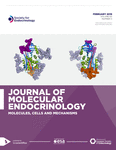The role of autophagy in angiotensin II-induced pathological cardiac hypertrophy
- 1Department of Pharmacology, School of Pharmaceutical Sciences, Shandong University, Jinan, Shandong Province, China
- 2Pharmaceutical Preparation Section, Central Hospital of Qingdao, Qingdao, Shandong Province, China
- Correspondence should be addressed to X Han; Email: xzyhan{at}sdu.edu.cn
Abstract
Pathological cardiac hypertrophy is associated with nearly all forms of heart failure. It develops in response to disorders such as coronary artery disease, hypertension and myocardial infarction. Angiotensin II (Ang II) has direct effects on the myocardium and promotes hypertension. Chronic elevation of Ang II can lead to pathological cardiac hypertrophy and cardiac failure. Autophagy is an important process in the pathogenesis of cardiovascular diseases. Under physiological conditions, autophagy is an essential homeostatic mechanism to maintain the global cardiac structure function by ridding damaged cells or unwanted macromolecules and organelles. Dysregulation of autophagy may play an important role in Ang II-induced cardiac hypertrophy although conflicting reports on the effects of Ang II on autophagy and cardiac hypertrophy exist. Some studies showed that autophagy activation attenuated Ang II-induced cardiac dysfunction. Others suggested that inhibition of the Ang II induced autophagy should be protective. The discrepancies may be due to different model systems and different signaling pathway involved. Ang II-induced cardiac hypertrophy may be alleviated through regulation of autophagy. This review focuses on Ang II to highlight the molecular targets and pathways identified in the prevention and treatment of Ang II-induced pathological cardiac hypertrophy by regulating autophagy.
- Received 30 July 2016
- Accepted 12 September 2016
- Made available online as an Accepted Preprint 12 September 2016
- © 2016 Society for Endocrinology











